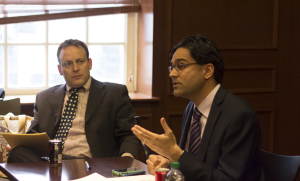
Monday marked the first day of the 2014 Indian general election, which will span a record 36 days, culminating May 12. Voting will take place in all 543 constituency districts of India to elect members of parliament in the Lok Sabha, which will determine the new prime minister. Students are raising awareness for the election, which may have serious repercussions for Asia and the world.
On April 3, the government department paired with the Georgetown South Asian Society to sponsor the event, “Indian Elections 2014: An Interactive Panel Discussion” at the Mortara Center. Government professor Matthew Rudolph moderated the event, which featured presentations by associate for the South Asia Program at the Carnegie Endowment for International Peace Milan Vaishnav, former U.S. Ambassador to Bangladesh Howard Schaffer and Indian political author, journalist and visiting scholar at Johns Hopkins University Kota Neelima.
“I hope that this is part of a wave where we see more student and university interest and effort in India. China always gets the limelight when we refer to Asia, and I for one and students supporting this event would like to see some balance,” Rudolph said.
The focus of the event was to discuss the electoral prospects of the main political parties, and to determine what the results could mean for India’s relationship with the United States. There are two frontrunners for the position of prime minister: Rahul Gandhi and Narendra Modi.
Gandhi’s incumbent Congress Party, supported by the poorest factions of Indian society, focuses on welfare initiatives and increased socioeconomic mobility. Gandhi himself is the scion of the Nehru-Gandhi dynasty that has dominated Indian politics since independence. Modi’s Bharatiya Janata Party runs on a platform of good governance and economic development, hoping to expose the alleged corruption and wastefulness of the Congress Party and current Prime Minister Manmohan Singh’s coalition government.
The BJP is favored in the election, as Vaishnav explained that Indians care most about economic development and corruption.
“When the Indian voter is asked, the single most important thing is the economy. Number two is corruption, and number three is inflation,” Vaishnav said. “Because the Congress hasn’t performed well on these issues, the BJP have attacked the incumbents on these core tenants and have focused their platform on these issues.”
Although the BJP are expected to win the most seats of any party in the Lok Sabha and lead a coalition government, the many regional parties whose major voting bases consist of lower-caste, working-class Hindus and Muslims will ensure that a variety of parties hold a sizable presence in the parliament. It will be up to the BJP to convince some of these crucial smaller parties to join them in order to cross the 272-seat mark and effectively form a majority functioning coalition in the Lok Sabha.
Vaishnav explained the collaboration between various parties in terms of political and security motivations.
“In the case of Tamil Nadu, a southern state, political leaders entering the coalition would want the major party to let the foreign policy dealing with Sri Lanka, which has an ethnic Tamil majority, fall to their state,” Vaishnav said.
All three panel experts predicted that Modi will win the election — what this will mean for U.S.-Indian relations is up for debate.
“Modi’s party will want good relations with the United States, as most Indian leaders have in the past. However, in the past six months, relations have soured a bit due to the arrest of Indian Consular Officer Devyani Khobragade in New York City on charges of visa fraud and making false statements to the U.S. State Department about her work,” Schaffer said.
Despite this scandal, the relationship between the two major powers looks to remain a strong and vital partnership for years to come.
Luis Joy Pérez (SFS ’17), one of the approximately 40 students in attendance, came away from the panel discussion with a better understanding of the Indian political system.
“I am now able to better comprehend the issues of India’s election and why the media has been portraying Narendra Modi as the heir-apparent for New Delhi,” Pérez said.
SAS Marketing Chair Mariam Matin (COL ’15) was happy to see that students were developing an interest in foreign electoral races.
“It was exciting to see the room filled with a combination of people both directly invested in the elections and people who were just curious to learn more. I think people got a good idea of some of the key trends at play for this election,” Matin said.
Yash Johri (SFS ’17) from Delhi, India, is a research assistant under Rudolph, and helped arrange the event. He agreed with the panel’s conclusions.
“I think that it will be a coalition government because I don’t think that any party will attain a majority. Modi’s party has captured the imagination of the youth interested in the main issues. What he’s focused on is economic development and not the regional or religious issues,” Johri said. “This election is more about the shortcomings of the incumbent party. The rampant corruption and mismanagement of the past five years is the main talking point for Modi and the reason why he will win.”
He hopes that the panel will create greater interest in India from the Georgetown community.
“This event is the beginning of a larger effort to bring India to Georgetown and to the D.C. community in particular. While I see an immense amount of emphasis laid upon studying China as the next great hegemon, having been in Washington for over eight months I have sensed that India’s presence isn’t really felt, and I feel it is important to educate the community on India’s importance in the world,” Johri said.




















